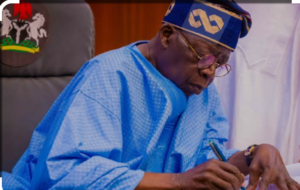Senate Supports Tinubu’s Plan to Secure $21.8 Billion in New Loans
Senate Supports Tinubu’s Plan to Secure $21.8 Billion in New Loans

Bola Ahmed Tinubu
On Tuesday, the Nigerian Senate granted approval to President Bola Tinubu’s 2025–2026 external borrowing plan, which includes a request to obtain $21.8 billion, €2.1 billion, and ¥15 billion in loans, along with a €65 million grant. The funds are earmarked for critical development projects across infrastructure, health, education, water, and other priority sectors.
As part of the broader financial strategy, the Senate also gave the green light for the Federal Government to issue a ₦757.98 billion bond in the domestic market, aimed at clearing pension arrears under the Contributory Pension Scheme (CPS). Thousands of retirees are expected to benefit from this long-awaited settlement.
Additionally, lawmakers approved a $2 billion borrowing initiative through a new domestic foreign-currency bond programme. This move is supported by Executive Order No. 16 of 2023, which authorizes the Debt Management Office (DMO) to raise dollar-denominated funds within Nigeria without depleting the country’s foreign reserves.
The approvals followed recommendations from the Senate Committee on Local and Foreign Debts, chaired by Senator Aliyu Wamakko.
However, the decision was not without controversy. Some senators raised alarms over Nigeria’s ballooning debt, currently estimated at over ₦121 trillion, with external liabilities surpassing $43 billion. Senator Abdul Ningi strongly opposed the motion, criticizing the lack of a clear repayment strategy.
> “These loans will be a burden for generations to come. I’ve reviewed the documents and see no solid plan for repayment,” Ningi said.
Still, others argued in favor of the borrowing. Senators such as Adetokunbo Abiru and Finance Committee Chairman Sani Musa insisted that the loans came with favorable terms and were essential for long-term economic growth.
President Tinubu first submitted the borrowing requests on May 27, emphasizing their role in funding impactful, high-return projects designed to boost the economy and improve public services.
Supporters of the plan say it marks a shift from the borrowing practices of previous administrations. Unlike past loans used to plug budget deficits, this funding is said to be targeted at specific, revenue-generating initiatives in sectors like power, transportation, technology, and social development.
Still, concerns persist.
> “Nigeria is essentially operating on borrowed time and money,” one opposition lawmaker told reporters. “People are battling high inflation, job losses, and currency instability while the government keeps expanding its debt profile.”
Analysts warn that while the new borrowing framework could create fiscal breathing room, the success of the plan depends on transparency, efficient project execution, and measurable returns.
Tuesday’s approvals offer the Tinubu administration greater financial leverage—but also increase pressure to deliver real improvements in the lives of ordinary Nigerians. For many, the ultimate question is: will this borrowing lead to meaningful development—or more economic hardship?
TRENDING SONGS
 NPMA Appeals to Nigerian Government for Compensation After Lagos Market Fire
NPMA Appeals to Nigerian Government for Compensation After Lagos Market Fire
 Rest Every Four Hours, FRSC Issues Safety Guide for Fasting Motorists
Rest Every Four Hours, FRSC Issues Safety Guide for Fasting Motorists
 NNPC Boss Ojulari Bags UK Energy Institute Fellowship
NNPC Boss Ojulari Bags UK Energy Institute Fellowship
 Shock in Anambra: Bride Disappears Moments Before Wedding
Shock in Anambra: Bride Disappears Moments Before Wedding
 Nigerian Woman Returns ₦330 Million Accidentally Credited to Her Account
Nigerian Woman Returns ₦330 Million Accidentally Credited to Her Account
 APC Don Reach Morocco?’ VeryDarkMan Reacts to Seyi Tinubu Poster
APC Don Reach Morocco?’ VeryDarkMan Reacts to Seyi Tinubu Poster
 Bride Breaks Down in Tears as Wedding Meals Were Kept Secretly While Guests Go Home Hungry
Bride Breaks Down in Tears as Wedding Meals Were Kept Secretly While Guests Go Home Hungry
 Odogwu by Day, Robber by Night: How Marriage Joy Turned Into Tragedy
Odogwu by Day, Robber by Night: How Marriage Joy Turned Into Tragedy
 Nigerian Officials Allegedly Pocket N4–6B Weekly Through Smuggling Cartels at Seme–Badagry Border
Nigerian Officials Allegedly Pocket N4–6B Weekly Through Smuggling Cartels at Seme–Badagry Border
 Ahmad Yerima: Naval Officer to Face No Sanctions After Clash with Wike – Matawalle
Ahmad Yerima: Naval Officer to Face No Sanctions After Clash with Wike – Matawalle
Share this post with your friends on ![]()













